|
|
|
Sort Order |
|
|
|
Items / Page
|
|
|
|
|
|
|
| Srl | Item |
| 1 |
ID:
180622
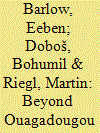

|
|
|
|
|
| Summary/Abstract |
The article evaluates the current worsening security situation in Burkina Faso and ties it to a lack of state-building in the country. Based on Tilly's approach to state-building, it, consequently, draws a set of recommendations aiming to strengthen the effectiveness of Burkinabe security forces as a primary step to stop the current wave of violence and establish more stable state institutions. These would become a first step of the process that is necessary to stabilise the situation in the region, enhance the Pillars of State, and allow the state institutions to overcome the militias. The article clearly states that foreign intervention and military solution only of the conflict cannot lead to a successful result. Burkina Faso needs to enhance institutional penetration throughout its territory to allow for the mitigation of the rebellions not only in this instance but also for the future and strengthen the state-building project.
|
|
|
|
|
|
|
|
|
|
|
|
|
|
|
|
| 2 |
ID:
138991
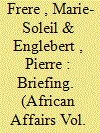

|
|
|
|
|
| Summary/Abstract |
BLAISE COMPAORÉ RESIGNED AND FLED BURKINA FASO on 31 October 2014 under the sustained assault of a coalition of youth, cultural leaders, civil society organizations and opposition parties, and after the defection of core segments of his military. Compaoré had been in power since the assassination of his predecessor Thomas Sankara on 15 October 1987. This briefing first discusses the actual sequence of events that led to the transition. We then identify some deeper trends that weakened the regime, including the dilemma of succession in a semi-authoritarian regime, the rise of youth and cultural elites as opposition actors who placed themselves beyond the reach of regime co-optation, and the use of Sankara imagery as a tool of mobilization. We then jointly analyse two features of the transition and the current regime of Lt-Col Isaac Yacouba Zida who, despite being only prime minister, appears to be the country’s new strongman. The first is the relative institutional uncertainty that accompanied the fall of the Compaoré regime and which continues to hamper the transition. The second is the enduring role of the military in Burkinabè politics. We conclude by singling out some implications of the transition and the challenges ahead.
|
|
|
|
|
|
|
|
|
|
|
|
|
|
|
|
| 3 |
ID:
145189


|
|
|
|
|
| Summary/Abstract |
CAN GENETICALLY MODIFIED (GM) CROPS help smallholder farmers in sub-Saharan Africa? To date, only two GM crops – insect-resistant forms of cotton and maize – have made it into the hands of African farmers. Of these, GM cotton has the longest empirical track record, having been the first GM crop ever introduced in Africa, and the only one that has been grown in multiple countries – first South Africa, then Burkina Faso.1 The performance of this crop has received intense scrutiny, as it offers the best indication of how the suite of other GM crops slated for commercial approval may perform across the continent.
This briefing reviews the experiences of South African farmers with GM cotton, which has emerged as the crucial precedent highlighting the value of GM crops for poor farmers. It then turns to the case of Burkina Faso, which became the showcase for how GM crops can benefit smallholder African farmers. However, as shown here, Burkina Faso has begun a complete phase-out of GM cotton, citing the inferior lint quality of the GM cultivars as the reason for abandoning its cultivation. Burkina Faso's phase-out could stall or even end negotiations to adopt GM cotton in other Francophone African countries with similar concerns over cotton quality. More generally, Burkina Faso's reversal could undermine public trust in GM crops across …
|
|
|
|
|
|
|
|
|
|
|
|
|
|
|
|
| 4 |
ID:
130285
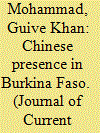

|
|
|
|
|
| Publication |
2014.
|
| Summary/Abstract |
Burkina Faso currently has no diplomatic relationship whatsoever with the People's Republic of China. Engaged in cooperation with Taiwan since 1994, it is one of only three African countries not a part of the Forum on China-Africa Cooperation. This unusual situation has produced a unique manifestation of the Chinese presence in Burkina Faso, where the estimated 600 Chinese migrants are primarily private entrepreneurs. This phenomenon of "globalization from below" - or, this migration of entrepreneurs that transcends the absence of diplomatic relations - creates new intimate social relations between the Burkinabe and Chinese people who come into contact with each other. Far from simply turning Chinese and Burkinabe into economic competitors, these relations have also led to the emergence of many forms of interpersonal and business cooperation. In this paper, I therefore demonstrate how Sino-African cooperation from below has developed in Burkina Faso, which stands in radical contrast to the latter's cooperation with Taiwan, which takes place almost exclusively on a broader state-to-state level. The empirical evidence of this study is drawn from field survey interviews and observations of both Chinese and Burkinabe entrepreneurs in Burkina Faso between 2010 and 2011.
|
|
|
|
|
|
|
|
|
|
|
|
|
|
|
|
| 5 |
ID:
103050


|
|
|
| 6 |
ID:
178524
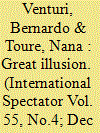

|
|
|
|
|
| Summary/Abstract |
Security sector reform (SSR) is regularly cited by states and regional organisations as crucial for stability in the Sahel. However, these declarations and interventions are not based on deep analysis, and much of the literature focuses overwhelmingly on the role of external actors or technical aspects of SSR. Against this backdrop, three preliminary factors need to be addressed in order to reform the security sectors in Burkina Faso and Mali: abuses and violations by regular armies; state support to non-state armed groups; and the securitisation of the region by external actors. In this context, SSR remains hamstrung and illusory: it is not inclusive, which threatens to undermine its outcome.
|
|
|
|
|
|
|
|
|
|
|
|
|
|
|
|
| 7 |
ID:
184684
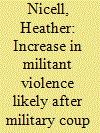

|
|
|
| 8 |
ID:
184705
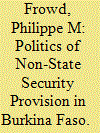

|
|
|
|
|
| Summary/Abstract |
This article examines the rise of the koglweogo self-defence groups in Burkina Faso, developing an empirical analysis of their practices and a conceptual approach to their ambiguous status. The article describes the ‘koglweogos’’ rise since 2014, their growth across urban and rural areas in Burkina Faso, and their involvement in tasks from crime-fighting to counterterrorism. The article builds on the existing literature on vigilantism and security provision in African states and outlines a conceptual framework highlighting the koglweogos’ pursuit of recognition. The koglweogo toggle between overlapping ‘amateur’ and ‘professional’ repertoires of security discourse and practice, pursuing recognition as security professionals but also the autonomy and flexibility of working in the margins. This emphasizes the symbolic value, social and political contestability, discursive construction, and imaginaries of security whilst eschewing a state/non-state binary. The article draws on fieldwork carried out with multiple koglweogo groups to highlight their role as auxiliaries in global security governance, their production of security claims in the absence of recognition, their production of public authority, and their relationship of collaboration with and contestation of the state. The article concludes with reflections on the broader utility of the concept of ‘security amateur’ in Africa and further afield.
|
|
|
|
|
|
|
|
|
|
|
|
|
|
|
|
| 9 |
ID:
180257


|
|
|
|
|
| Summary/Abstract |
Coup leaders often purport to restore constitutional order. During Burkina Faso's 2014 ‘insurrection', however, Blaise Compaoré's opponents advanced detailed (international) legal arguments that significantly constrained their subsequent conduct. Theirs was to be a legal revolution. This article situates this stance within Burkina Faso's distinctive history of urban protest, whilst emphasising under-analysed international sources for the insurrection. ‘Insurgent’ lawyers, it argues, used international instruments to reinvigorate longstanding activist attempts to reconcile constitutional rights with a language of popular justice promoted by the revolutionary regime of Thomas Sankara (1983–7). After the insurrection, however, their emphasis on legality was used by Compaoré's supporters to expose the transitional authorities’ double-standards. Meanwhile, insurgent lawyers working for the transition had to work hard to reconcile (international) legal justifications for the insurrection with the expedient politics needed to defend the new dispensation.
|
|
|
|
|
|
|
|
|
|
|
|
|
|
|
|
| 10 |
ID:
151494


|
|
|
|
|
| Summary/Abstract |
In Burkina Faso in 2011 military mutinies followed widespread civilian protests, indicating a crisis of confidence in President Compaoré. Through an in-depth examination of the events, this article encourages an understanding of military revolts that extends beyond the military. Although the mutineers never united with the demonstrators, their grievances mirrored those of the civilians. The article puts the revolts into a historic context and shows a pattern of interconnectedness between military revolts and civilian demonstrations in Burkina Faso. The work draws on interviews conducted with military personnel and civilians involved in the widespread protests.
|
|
|
|
|
|
|
|
|
|
|
|
|
|
|
|
| 11 |
ID:
087721
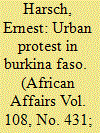

|
|
|
|
|
| Publication |
2009.
|
| Summary/Abstract |
Burkina Faso has embarked on a course of decentralization in which elected local governments are assuming a share of decision making over a range of services and activities previously under central authority. But many of these municipalities have also become sites and targets of popular contestation, a reality that has rarely been acknowledged in the official discourses of decentralized governance. By employing social movement research methods, this article examines more than 200 public demonstrations, marches, sit-ins, strikes, riots, and other forms of protest over local issues in 31 of Burkina's urban municipalities, from 1995 to 2007. It finds that both local government reactions and the protests themselves are strongly influenced by the national political context. The analysis highlights some of the main grievances raised by protesters, from opposition to police violence and merchants' frustrations over the management of marketplaces, to residents' concerns about municipal corruption and resistance to neighbourhood displacement resulting from urban 'modernization' schemes. By challenging the performance of Burkina's municipal councils and mayors, ordinary residents are exercising 'voice' and seeking to give some real substance to notions of participatory decentralization.
|
|
|
|
|
|
|
|
|
|
|
|
|
|
|
|
|
|
|
|
|